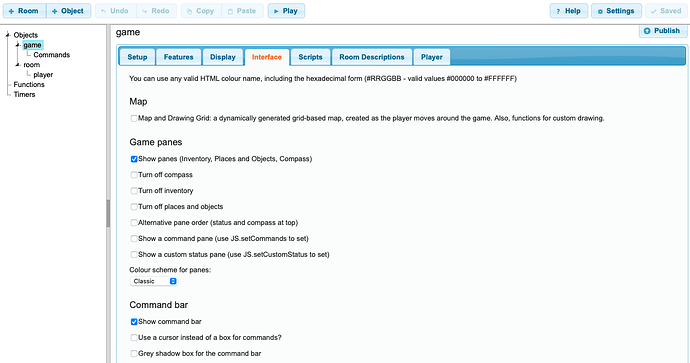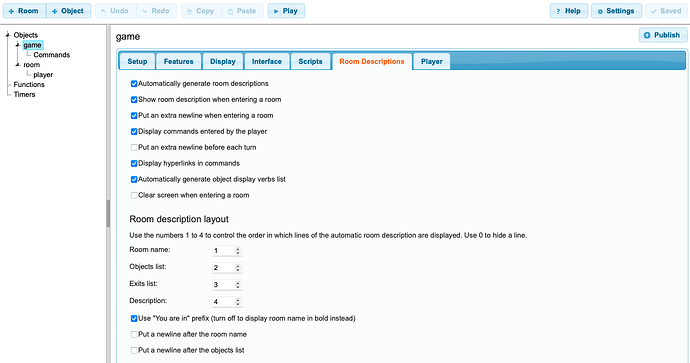Huh, so something like a meta parser game lol. I mean if you’re able to create the game in something approximating English in Inform 7, I’m sure you could also get something to output Inform code by asking questions to make a game.
Let’s not, or some huge tech company is going to use generative AI to produce new interactive fiction and completely eliminate human creative endeavor.
No huge tech companies needed, there are enough hobbyists trying things with generative AI and IF lol
Exactly.
That already exists. The games are interactive, but they are created by something called BIG FISH. BUT it is small companies that create the games, a team of programmers, graphic designers and video photographers. Each game costs $6.99 to $19.99. Depending on whether you join their game club or not. They are close to interactive fiction, but graphic and extremely popular. Pretty linear.
Already been done. Interactive Fiction still offers things it does not, so I don’t think people need worry.
heh
I’ve been thinking a lot about parser vs. choice-based (the latter being Ink, Twine, etc.).
I think what I want out of interactive fiction as both and author and a player is to:
- feel involved
- feel clever / accomplished
- not feel frustrated
I think it is far easier for parser games to make you feel frustrated because they fall into an uncanny valley of understanding what you type … but only to a point.
But I will still play (and author) a parser game because I feel far more involved. Choice-based has a different frustration - the frustration of the menu of responses simply not including the response I really want to make?
And when I solve a puzzle with a parser game, I feel more accomplished, especially when there are steps that are obvious but without a big sign pointing right at them.
For example, using threaded conversation, you can discuss the topics that might be provided to you, but there may be additional hidden topics you can bring up. Yes, in the back of your mind, you know that the author had to come up with each and every one of these conversations and responses, each puzzle and solution, but there’s still a moment where you, as the player, have a moment where you feel you’ve discovered something new.
It’s like magic tricks: you see the coin dissappear, and you know there’s no real magic … but for just an instant, maybe there is.
My reaction to the Game Constructor idea is basically, “So Mario Maker, but for Text Adventure dungeons?” Which part of me says would be cool, but I’m not sure that level of level creation would be as viable for IF as it would be for a video game.simplification
And I can get down with things like choosing a flavor of ice cream and the most effect it has on the story is a one line alteration to an NPC’s dialog that’s immediate. I can also get behind choices that have no impact on the story, but which alter order of events or which events you’re witness to(e.g. the MacGuffin has been broken into three parts and you can go after the parts in any order, but the rival faction will always just so happen to be going after the same piece you’re going after, so the story doesn’t change, or two NPCs have their own plot lines playing out at the same time, but you can only tag along with one of them and seeing the other requires a second play through if you are so inclined).
Most decisions in real life don’t have destiny altering ramifications, so it would be unrealistic for a game to only include such pivotal decisions.
I will agree that it can be annoying when seemingly trivial decisions end up being destiny altering and seemingly pivotal decisions end up being glorified next buttons, but I think part of the issue there is that it can be tricky to communicate the importance of a decision in a way that is both unambiguous and doesn’t break immersion.
And in general, I think people have a hard time going “Meh, not my thing.” without descending into a tirade about everything wrong with things they don’t like… Granted, it doesn’t help either that many people have trouble hearing/seeing “meh, not my thing” in regards to something they like without it mutating into “This is stupid, and if you like it, you’re stupid” and going rabid fanboy/fangirl on the apathetic commenter. It’s almost like one isn’t allowed to be apathetic about media and it pushes people to hate on things they would otherwise be apathetic about. And it’s not just an IF thing, but a phenomena at least as old as the concept of a fandom war and perhaps at least as old as the Roman Empire(look up Blues versus Greens as it relates to Roman Culture if you don’t believe me).
“People are different and that’s okay” is a concept a lot of people struggle with.
Definitely. Sometimes people do hear when I say I don’t like something “you’re stupid to like it.” Maybe I may FEEL that way sometimes, but on the whole I enjoy other people’s creativity.
I read all the time and I read ebooks from Amazon, often Kindle Unlimited. If a book doesn’t grab in the first two chapters I return it and get another one. But the first one may get good reviews from other people.
There are literally tons of ebooks out there. The choice is huge. There tons more IF “games” out there now then when I was here was 15 years ago. Lots to choose from.
As a used car salesman out of San Jose used to say, he sponsored late night movies for years, back when there were just basic channels and TV signed off early, he did very few repeats. Not 365 a year, because of popular holiday movies. I saw tons of great old B&W movies from before my time. Some color too. Some classics and Academy Award winners, it was lots of fun.
He said, “Different strokes for different folks.”
Price slashing for his cars, but it had deeper meaning, the movies themselves. They ranged from Fred Astaire and Ginger Rogers light hearted dancing movies to things like the Lost Weekend and A Gentleman’s Agreement.
Marnie aka that Doe person ![]()
This would be a really interesting way to deliver writing prompts.
You think?
Me too.
This is sort of how Quest works. It doesn’t ask questions, but is managed via checkboxes and drop-downs and fill-in fields. There is optional scripting as well.
Temporary frustration is essential to accomplishment. The classic adventure games were immensely frustrating, and immensely rewarding when we finally broke past the challenges.
That assumes you can break past the challenges without a walkthrough lol. I’m extremely bad at puzzle games.
Inform and TADS are being advertised for allowing you to use graphics, but I find it unbelievably difficult to actually do that.
I still think text+graphics is the next level of text adventures, and I’d love to have fixed boxes for text and graphics, maybe 1893 style. But I still have no idea how to do that, despite looking up lots of sources. I’d like an IF programming language to let me define boxes, chose one for current output, and put out either text or graphics, so that all that’s left for me to do is to make sure that allgraphics have the same format. But no, not happening. That really makes me sad.
The problem with frustration is that it refers to two very different concepts, one of which is often a hallmark of good game design, the other of bad game design.
“Good” frustration: The game is hard because it presents the player with a legitimate skill/knowledge challenge that the player has all the tools to overcome and which instill a sense of accomplishment when the player finally succeeds.
“Bad” frustration: The game knocks the player down in a way that seems unfair or cheap where success seems more based on dumb luck, brute force, or possessing out of game information neither the game nor its manual ever hints at, that at best leave the player feeling relieved to get past the hurdle or that overcoming it was a waste of time with no sense of accomplishment.
Granted, like most things, it’s a spectrum, not a binary and some players have more tolerance for games just being unfair than others.
Adventuron has default graphics support. The bottom pane is text and the top pane is graphics.
True. But the graphics quality is limited, and I’m already working with Inform 6, Inform 7 and TADS, and that’s really enough for me.
But text + graphics gets you… graphic adventures, which have been around for nearly forty years.
Interactive fiction is pretty much defined by the absence of a technology that has been around for two generations.


